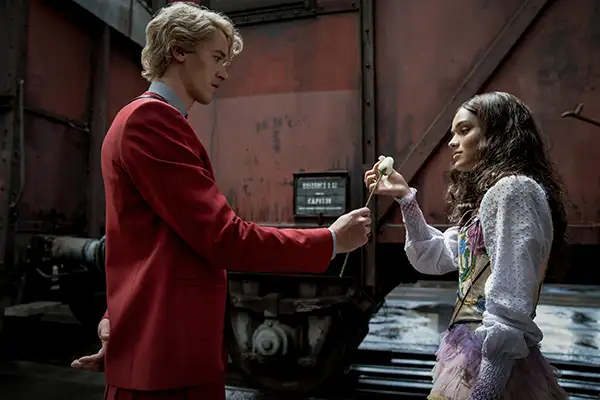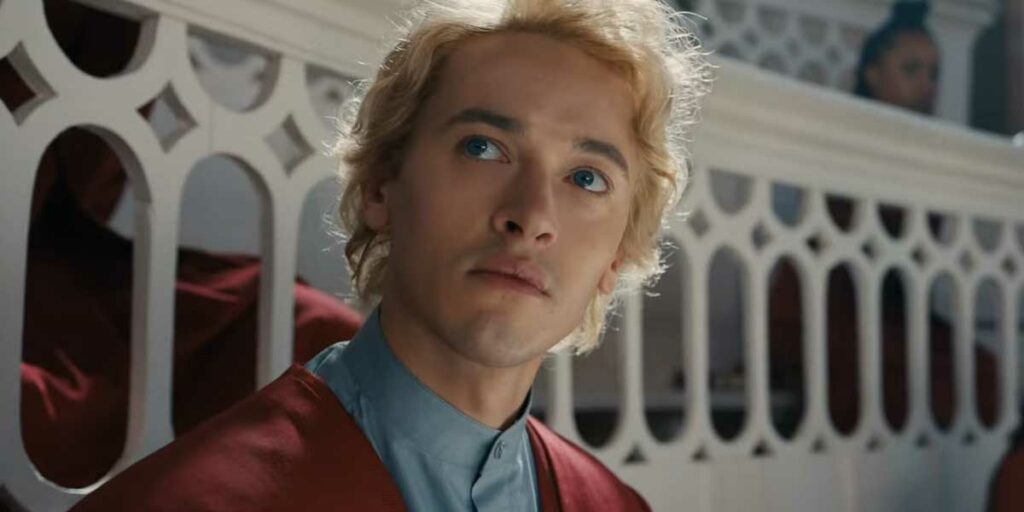Zegler and Blyth shine in The Hunger Games: The Ballad of Songbirds and Snakes, a prequel with great worldbuilding and some storytelling issues.
If you’ve seen the first Hunger Games movies or read the books, you probably have a very specific idea of who President Snow is. But the Coriolanus Snow (Tom Blyth, of Benediction) we meet in The Ballad of Songbirds and Snakes is a very different young man than the one we’ve gotten to know these past few years. Directed by Francis Lawrence (of Catching Fire and Mockingjay) and based on Suzanne Collins’ novel of the same name, the film takes place in a post-war Panem, 64 years before Katniss Everdeen (Jennifer Lawrence) volunteered as tribute. The 10th Hunger Games are about to begin, and Coriolanus — or Coryo, like his Grandma’am (Fionnula Flanagan) and his cousin Tigris (Hunter Schafer, of Euphoria) call him — is a young graduate at an elite school for the wealthy called the Academy, with a promising future in the Capital.
But the difference between Coryo and his peers is that our President-to-be’s family fell from grace when his deceased father, General Snow, was discovered to be a rebel. Though Coriolanus is definitely not as wealthy as most of the other students, he makes up for it by being exceptionally bright — so bright that he might even turn out to be the recipient of the prestigious Plynth prize, which would enable him to feed his family. But when the Academy’s students are waiting to find out who’ll get to go home with the award, on the same day as the Reaping, they get a very different announcement from Dean Casca Highbottom (Peter Dinklage, of Cyrano) and Head Gamemaker Volumnia Gaul (Viola Davis, of Air) instead.
Since the citizens of Panem have lost interest in the Hunger Games, they’ve decided to give the students “one last assignment to prove [their] worth.” Each of them will become a mentor to one of the tributes, and the best mentor will win the prize. Their job? Persuading the tributes to perform for the audience — or, as Dr. Gaul puts it, “turn these children into spectacle, not survivors.”
And spectacle they are, indeed, as the Hunger Games are very different to what we’re used to, in The Ballad of Songbirds and Snakes. There’s no worldbuilding in an arena that is exactly what the name would suggest: an amphitheatre of sorts, built of stone, where people fight to the death. And there are no interviews held with the tributes, no donations from sponsors, no terrifying scenarios envisaged by the Gamemakers to make the stakes higher.
But Coryo is determined to win, and being the talented student that he is, he immediately understands what the Games need to become, if Panem’s authorities want people to watch them. And when his ideas reach Dr. Gaul herself, she immediately recognizes his potential, and starts to implement them. And as all of this happens, Coryo deals with his mentee: Lucy Gray Baird (Rachel Zegler, of West Side Story), a “rug girl” who’ll turn out to be so much more than a quirky orphan who can sing, and who loves to make an appearance.

As the Hunger Games begin and the students try their best to turn the tributes into the “spectacle, not survivors” that Dr. Gaul wants them to be, Coryo has to juggle his responsibilities toward the game while trying to save the people he cares about: his family, who risks being evicted, his friend and fellow mentor Sejanus Plinth (Josh Andrés Rivera, of Cat Person), who used to be from District 2, and Lucy Gray, with whom a romance is starting to bloom. But as all of this happens and we see him grow and evolve, we realise that, if the tributes are “spectacle,” Coryo is the “survivor” – a young man who often finds himself having to make life-or-death decisions completely on his own, to please people who want to use him, and without being able to really trust anyone.
What makes the first hour or so of The Ballad of Songbirds and Snakes so gripping is that we really care for the characters: not only Coryo himself, but also the mentors and tributes, and Lucy Gray in particular. The chemistry between Zegler and Blyth is exceptional, and watching them together is both effortless and rewarding, as we root for them to survive the Hunger Games despite the odds not being exactly “in their favour”. Another highlight are the scenes between Coryo and Dr. Gaul, which often feel like a game of chess where both characters are saving their best moves for the very end. Viola Davis is superb and gives us a convincing villain who’s clever enough to be intriguing and unpredictable enough to be absolutely terrifying.
Sadly, the second half of the film is where the issues with the screenplay emerge. The main one is that, the moment we leave the arena and start following Coriolanus on the next stage of his life, it becomes painfully evident that we don’t really know who Coryo is, and neither does the movie. In terms of his backstory, we keep being reminded that he’s “General Cassius Snow’s son”, in a “you have your mother’s eyes” Harry Potter sort of way, but we’re given little to no information as to who his father actually was. We get a brief glimpse at his childhood at the very beginning of the movie, but we don’t spend enough time with his grandma and cousin to know what really happened to him, and which scars and trauma it left him with. His fixation with roses has to do with his mother, yet we never really learn why they’re so important to him.
The lack of backstory makes Coriolanus a difficult character to figure out, particularly when the Hunger Games end, but what’s even worse is that we soon lose track of what his motivations are, too. When the Games end, Coryo is sent away from Panem, and a new phase of his life begins where he finds himself torn between his duties toward the Capital and his family, and his desire to protect Lucy and Sejanus. But the decisions he makes, especially as we get closer to the end, are puzzling at best, as it feels like he doesn’t even know what he wants, but not in a fascinating way — more in a “Coryo needs to become President Snow by the end of the movie” sort of way. And when he suddenly does become the genocidal tyrant we know from the other Hunger Games movies, not only is it extremely hard to know what’s going on in his head, but we don’t even really care anymore.
Lucy is a more interesting character, but her lines get worse in the second act too, verging into melodrama, and this prevents us from really connecting with her on an emotional level, despite the truly excellent work Zegler delivers here. Schafer’s Tigris is one of the most likeable characters, but we have very little screen time with her, which is a shame. Peter Dinklage eventually gets his moment to shine as Dean Highbottom, but spends most of the film feeling very one-dimensional. Thankfully, Jason Schwartzman is perfect as weatherman-turned-Hunger Games host Lucretius “Lucky” Flickerman, a “man who needs no introduction” who steals the show in every scene he’s in.
There’s still a lot to like in The Ballad of Songbirds and Snakes. The film is gripping and entertaining in the first half, and the combination of stunning cinematography and a great premise make this journey to Panem worth taking. Not only that, but Blyth and Zegler are superb, both together and apart, delivering two protagonists that you’ll genuinely care about for at least an hour. It’s also an extremely well-cast movie, as every single actor is perfect for their role, with particularly memorable turns from Viola Davis, Hunter Schafer, and Andrés Rivera. Even when it loses the pace and the narrative becomes muddled in the second half, it never gets to the point where you want it to end.
I’m a fan of both Suzanne Collins’ original trilogy and the Hunger Games movies, but I haven’t read “The Ballad of Songbirds and Snakes”. Talking with friends who have, I learned a lot about Coriolanus’ and Lucy’s pasts and motivations, and this made me understand the film so much better. Keeping this in mind, those who are familiar with the novel and who already have that prior knowledge will probably enjoy watching their favorite characters on the big screen regardless of the film’s flaws. Personally, I left the screening feeling like I needed a prequel to this prequel, so I would finally understand who the film’s protagonist actually is.
The Hunger Games: The Ballad of Songbirds and Snakes will be released globally in theaters on November 17, 2023. Read our ranking of all the Hunger Games movies and find out why Catching Fire is the best Hunger Games film!

